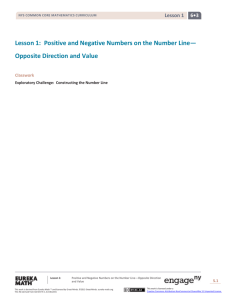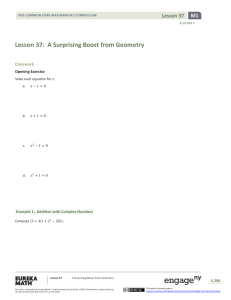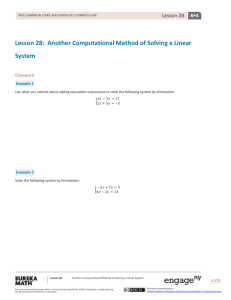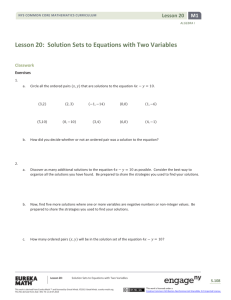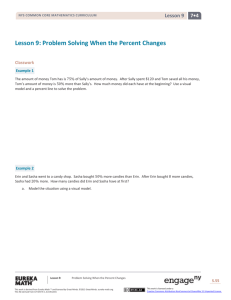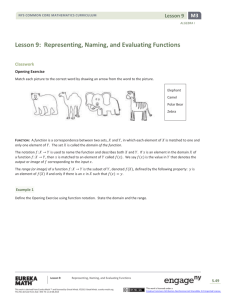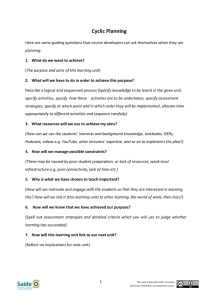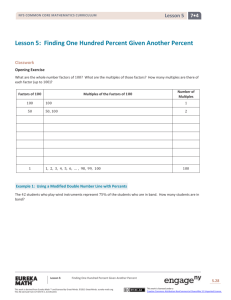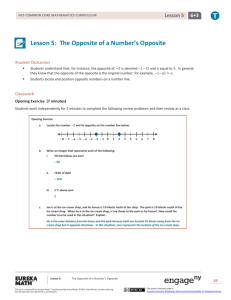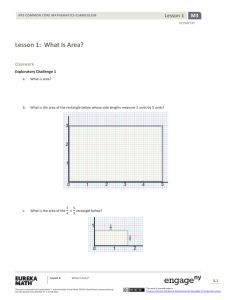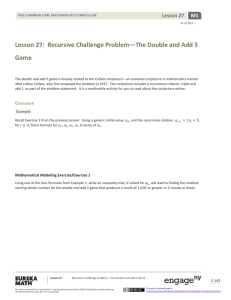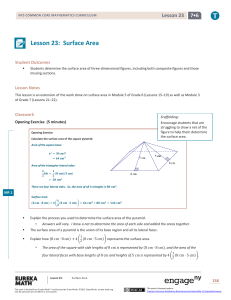Lesson 8: Definition and Properties of Volume
advertisement
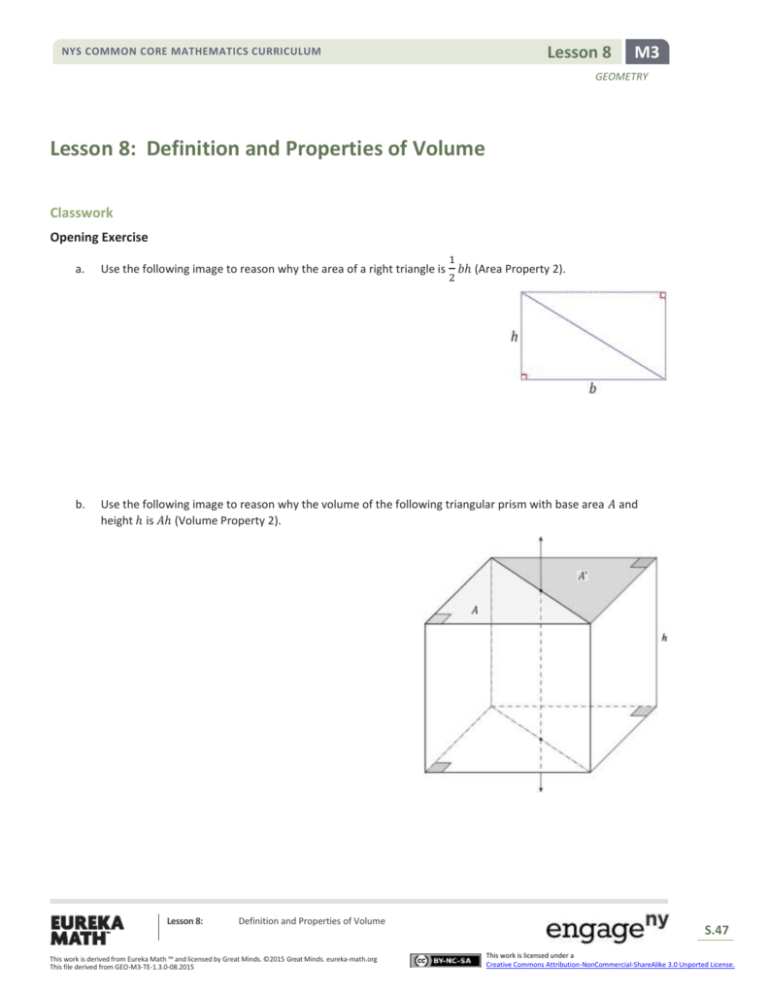
Lesson 8 NYS COMMON CORE MATHEMATICS CURRICULUM M3 GEOMETRY Lesson 8: Definition and Properties of Volume Classwork Opening Exercise 1 𝑏ℎ (Area Property 2). a. Use the following image to reason why the area of a right triangle is b. Use the following image to reason why the volume of the following triangular prism with base area 𝐴 and height ℎ is 𝐴ℎ (Volume Property 2). Lesson 8: Definition and Properties of Volume This work is derived from Eureka Math ™ and licensed by Great Minds. ©2015 Great Minds. eureka-math.org This file derived from GEO-M3-TE-1.3.0-08.2015 2 S.47 This work is licensed under a Creative Commons Attribution-NonCommercial-ShareAlike 3.0 Unported License. NYS COMMON CORE MATHEMATICS CURRICULUM Lesson 8 M3 GEOMETRY Exercises Complete Exercises 1–2, and then have a partner check your work. 1. Divide the following polygonal region into triangles. Assign base and height values of your choice to each triangle, and determine the area for the entire polygon. 2. The polygon from Exercise 1 is used here as the base of a general right prism. Use a height of 10 and the appropriate value(s) from Exercise 1 to determine the volume of the prism. Lesson 8: Definition and Properties of Volume This work is derived from Eureka Math ™ and licensed by Great Minds. ©2015 Great Minds. eureka-math.org This file derived from GEO-M3-TE-1.3.0-08.2015 S.48 This work is licensed under a Creative Commons Attribution-NonCommercial-ShareAlike 3.0 Unported License. Lesson 8 NYS COMMON CORE MATHEMATICS CURRICULUM M3 GEOMETRY We can use the formula density = 3. 4. mass to find the density of a substance. volume A square metal plate has a density of 10.2 g/cm3 and weighs 2.193 kg. a. Calculate the volume of the plate. b. If the base of this plate has an area of 25 cm2 , determine its thickness. A metal cup full of water has a mass of 1,000 g. The cup itself has a mass of 214.6 g. If the cup has both a diameter and a height of 10 cm, what is the approximate density of water? Lesson 8: Definition and Properties of Volume This work is derived from Eureka Math ™ and licensed by Great Minds. ©2015 Great Minds. eureka-math.org This file derived from GEO-M3-TE-1.3.0-08.2015 S.49 This work is licensed under a Creative Commons Attribution-NonCommercial-ShareAlike 3.0 Unported License. NYS COMMON CORE MATHEMATICS CURRICULUM Lesson 8 M3 GEOMETRY Problem Set 1. Two congruent solids 𝑆1 and 𝑆2 have the property that 𝑆1 ∩ 𝑆2 is a right triangular prism with height √3 and a base that is an equilateral triangle of side length 2. If the volume of 𝑆1 ∪ 𝑆2 is 25 units 3, find the volume of 𝑆1 . 2. Find the volume of a triangle with side lengths 3, 4, and 5. 3. The base of the prism shown in the diagram consists of overlapping congruent equilateral triangles 𝐴𝐵𝐶 and 𝐷𝐺𝐻. Points 𝐶, 𝐷, 𝐸, and 𝐹 are midpoints of the sides of triangles 𝐴𝐵𝐶 and 𝐷𝐺𝐻. 𝐺𝐻 = 𝐴𝐵 = 4, and the height of the prism is 7. Find the volume of the prism. 4. Find the volume of a right rectangular pyramid whose base is a square with side length 2 and whose height is 1. Hint: Six such pyramids can be fit together to make a cube with side length 2, as shown in the diagram. 5. Draw a rectangular prism with a square base such that the pyramid’s vertex lies on a line perpendicular to the base of the prism through one of the four vertices of the square base, and the distance from the vertex to the base plane is equal to the side length of the square base. Lesson 8: Definition and Properties of Volume This work is derived from Eureka Math ™ and licensed by Great Minds. ©2015 Great Minds. eureka-math.org This file derived from GEO-M3-TE-1.3.0-08.2015 S.50 This work is licensed under a Creative Commons Attribution-NonCommercial-ShareAlike 3.0 Unported License. NYS COMMON CORE MATHEMATICS CURRICULUM Lesson 8 M3 GEOMETRY 6. The pyramid that you drew in Problem 5 can be pieced together with two other identical rectangular pyramids to form a cube. If the side lengths of the square base are 3, find the volume of the pyramid. 7. Paul is designing a mold for a concrete block to be used in a custom landscaping project. The block is shown in the diagram with its corresponding dimensions and consists of two intersecting rectangular prisms. Find the volume of mixed concrete, in cubic feet, needed to make Paul’s custom block. 8. Challenge: Use card stock and tape to construct three identical polyhedron nets that together form a cube. Lesson 8: Definition and Properties of Volume This work is derived from Eureka Math ™ and licensed by Great Minds. ©2015 Great Minds. eureka-math.org This file derived from GEO-M3-TE-1.3.0-08.2015 S.51 This work is licensed under a Creative Commons Attribution-NonCommercial-ShareAlike 3.0 Unported License.
